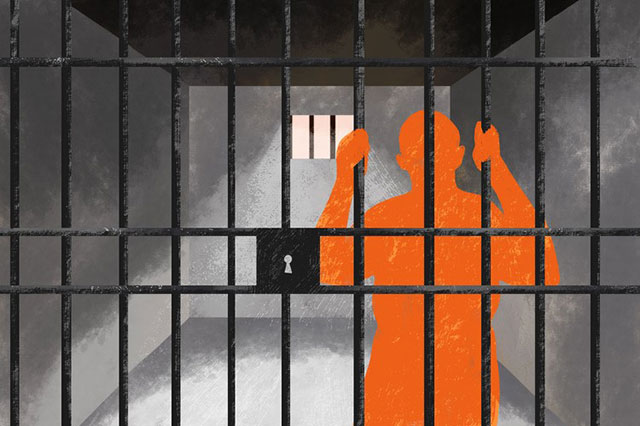Solitary confinement is not allowed in South Africa, but the Judicial Inspectorate says many prisoners are nevertheless being kept in solitary confinement. Illustration: Lisa Nelson
By Sonia Rao
- A 2021 report from the Judicial Inspectorate for Correctional Services states that hundreds, even thousands, of prisoners have been kept in solitary confinement.
- Segregation, a form of isolation, is allowed, but only up to 30 days and under strict conditions. Yet the Judicial Inspectorate’s report says prisoners are kept for months and even years in solitary confinement.
- Spokespeople for the Ministry of Justice and the Department of Correctional Services did not comment.
Some prisoners in South Africa’s largest correctional centres have been kept in solitary confinement for up to nine years. This is according to a September 2021 report by the Judicial Inspectorate for Correctional Services (JICS).
The report on solitary confinement, obtained from JICS by GroundUp this week, describes conditions in Ebongweni Super-Maximum Correctional Centre (Ebongweni), Kgosi Mampuru II C-Max Correctional Center (C-Max) and Mangaung Public-Private Partnership Correctional Center (Mangaung PPP).
It was submitted to the National Commissioner, the Ministry and the Portfolio Committee on Correctional Services.
Solitary confinement is defined by the UN’s Nelson Mandela Rules as the confinement of prisoners for 22 or more hours a day without meaningful human contact. Prolonged solitary confinement occurs for a period of over 15 consecutive days.
Both practices are banned in South Africa by a 2008 amendment to the Correctional Services Act.
But segregation, a form of isolation which is not allowed to exceed seven days or be extended over 30 days, is permitted. Segregated inmates must be visited once every four hours by a correctional official, once a day by the head of the Correctional Centre. Their health must be assessed daily.
But the JICS report makes the case that both solitary confinement and prolonged solitary confinement are practiced in South African correctional centres, particularly in Ebongweni and C-Max.
The report noted that at Ebongweni inmates are locked up alone in a 2 by 2.5m cell for 23 hours a day without stimulation or human contact. Food is given to them through a thin sliver in the door, and they are allowed a single daily hour of exercise in an “isolated exercise cage.”
JICS interviewed several inmates in Phase One and Phase Two of Ebongweni’s three-phase “behaviour modification” program, who told them they have lost counts of days and nights.
One C-Max inmate, who formerly spent time at Ebongweni, told JICS he felt he was being treated as if “I have committed the worst crime in the entire world”. He complained about his mental state, well-being and sense of humanity and dignity.
The minimum amount of time spent in Phase One at Ebongweni, which the JICS report equates with solitary confinement, is six months. Furthermore, as of February 2021, JICS found that there were 363 people incarcerated in Ebongweni’s Phase One for over six months.
One inmate spent nine years in Phase One, another four and a half years.
“If these two inmates remain in this position, there can be little doubt there are others,” the report states.
The report states: “Under democracy, hundreds and even thousands of inmates have been subjected to these practices.”
According to the Vera Institute of Justice, which the report cites, solitary confinement is associated with psychological damage and lasting neurological and physiological impacts. It affects correctional officials who work in solitary confinement units and families of inmates placed in solitary confinement. And, the units are expensive to run.
Solitary confinement also has a long history in South Africa, where prisons enforced harsh practices during apartheid. The Commission of Inquiry into Alleged Incidents of Corruption, Maladministration, Violence or Intimidation said in 2005: “Solitary confinement is a product of our past and should not be resorted to as a norm by prison officials in the new democratic order.”
In August 2021, the Department of Correctional Services (DCS) responded to a 2019 JICS report on Ebongweni with this statement: “The facility is designed in such a way that inmates [are] incarcerated in solitary confinement for twenty three hours and given one hour exercise, which is in accordance with the Standard Operating Procedures of the facility. It is anticipated that the concerns raised by JICS in respect of solitary confinement, will be considered in the aforementioned draft policy.”
But spokespeople for DCS and the Minister of Justice and Correctional Services did not respond to GroundUp’s requests for comment about the 2021 solitary confinement report.
Extract from the JICS report
Solitary confinement and prolonged solitary confinement are practised in South African correctional centres, in particular C-Max and Ebongweni. Under democracy, hundreds and even thousands of inmates have been subjected to these practices. Solitary confinement (on a case by case basis) and prolonged solitary confinement are acts of torture. This is contrary to the Constitution, the CSA, Torture Act and international law. DCS must reform the current state of C-Max and Ebongweni. Solitary confinement went from a harsh method during apartheid to a desperate last resort in the peak of the post-apartheid crime wave. It is now a common practice. The “worst of the worst” has become a norm – without making us safer. In 2005, the Jali Commission found that there was a culture of impunity in DCS; segregations were ordered as forms of punishment; there was no indication that prisoners were sent there through a fair process; and there was abuse of segregated isolated detention. These findings sadly resonate with what JICS now finds.
The public deserves to know what is being done in their name, to fellow members of their communities and with taxpayer money. JICS will continue to uncover and speak out on solitary confinement in South African correctional centres.
JICS hopes that DCS can meaningfully and constructively engage on this serious issue.
Follow African Insider on Facebook, Twitter and Instagram
Picture: Pexels
For more African news, visit Africaninsider.com


